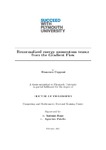Renormalized energy momentum tensor from the Gradient Flow
| dc.contributor.supervisor | Antonio, Rago | |
| dc.contributor.author | Capponi, Francesco | |
| dc.contributor.other | Faculty of Science and Engineering | en_US |
| dc.date.accessioned | 2017-03-08T11:33:31Z | |
| dc.date.available | 2017-03-08T11:33:31Z | |
| dc.date.issued | 2017 | |
| dc.date.issued | 2017 | |
| dc.identifier | 10463782 | en_US |
| dc.identifier.uri | http://hdl.handle.net/10026.1/8598 | |
| dc.description.abstract |
Strongly coupled systems are elusive and not suitable to be described by conventional perturbative approaches. However, they are ubiquitous in nature, especially in particle physics. The lattice formulation of quantum field theories provided a unique framework in which the physical content of these systems could be precisely determined. Combined with numerical techniques, the lattice formalism allowed to precisely determined physical quantities describing the thermodynamics, as well as the spectroscopy of strongly interacting theories. In this work, the lattice formulation has been employed to probe the effectiveness of a recently proposed method, which aims at determining the renormalized energy-momentum tensor in non perturbative regimes. The latter plays a fundamental role to quantitatively describe the thermodynamics and fluid-dynamics of hot, dense systems, or to characterize theories that enlarge the actual standard model. In all these aspects, only a non perturbative approach provides physically reliable results: hence a non perturbative determination of the energy momentum tensor is fundamental. The new method consists in defining suitable lattice Ward identities probed by observables built with the gradient flow. The new set of identities exhibits many interesting qualities, arising from the UV finiteness of such probes, and allows to define a numerical strategy for estimating the renormalization constants of the lattice energy-momentum tensor. In this work the method has been tested within two different quantum theories, with the purpose of understanding its effectiveness and reliability. | en_US |
| dc.language.iso | en | |
| dc.publisher | University of Plymouth | |
| dc.rights | CC0 1.0 Universal | * |
| dc.rights.uri | http://creativecommons.org/publicdomain/zero/1.0/ | * |
| dc.subject | EMT | |
| dc.subject | Gradient flow | |
| dc.subject | Renormalization group | |
| dc.subject | Non perturbative renormalization | |
| dc.subject | Ward Identities | |
| dc.subject | Lattice | en_US |
| dc.subject.classification | PhD | en_US |
| dc.title | Renormalized energy momentum tensor from the Gradient Flow | en_US |
| dc.type | Thesis | |
| plymouth.version | publishable | en_US |
| dc.identifier.doi | http://dx.doi.org/10.24382/861 | |
| dc.rights.embargoperiod | No embargo | en_US |
| dc.type.qualification | Doctorate | en_US |
| rioxxterms.version | NA |
Files in this item
This item appears in the following Collection(s)
-
01 Research Theses Main Collection
Research Theses Main



